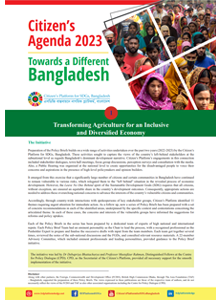 Background and Context
Background and Context
The spirit of ‘Leave no one behind’, which informs the implementation of the Sustainable Development Goals (SDGs), stipulates that issues of concern and interest to the most vulnerable and marginalised groups in society ought to be prioritised in view of attaining the global as well as national goals. The idea is to ensure that no segment of society is excluded from the development process and its positive outcomes. In no sector is this as important and relevant as the agriculture sector. Attainment of many SDGs, not to speak of SDG 2 (zero hunger) and SDG 1 (zero poverty), crucially hinges on the performance of this sector. In the context of developing countries, there is a rich literature that shows that one of the most effective ways to improve the lives of the left behind and marginalised people and those living below the poverty line is to support the growth of the agriculture sector in a way that keeps the concerns and interests of the people engaged in agriculture and living in rural areas at the centre of agricultural transformation.
The agriculture sector broadly includes crops, animal farming, forests and fishing activities in the Bangladesh context. According to de Janvry & Sadoulet (2020), “current wisdom on how to use agriculture for development is that it requires asset building for smallholder farmers, productivity growth in staple foods, an agricultural transformation (diversification of farming systems toward high-value crops) and a rural transformation (value addition through rural non-farm activities linked to agriculture)”.1[1] To note, in Bangladesh, about 90 per cent of the farms are small holdings, with land size ranging from 0.5 to 2.5 hectares; more than 50 per cent have at most one acre of land (Agricultural Census, 2022). In view of this, the Policy Brief focuses on issues of interest, particularly to marginal and small farmers and the challenges they face in accessing inputs, production and marketing, and in view of the transition that will need to take place in agriculture for its modernisation and transformation becoming of an upper middle income developing country beyond 2030. It is argued in the Policy Brief that a small-farmer focused agricultural transformation is desirable not only from the perspectives of fairness but also from the vantage point of inclusivity and socio-economic development of Bangladesh going forward. The key objective of the Policy Brief is to identify the underlying factors driving the current state of the agriculture sector in Bangladesh and identify the gaps in policies in view of what is required for agricultural transformation and modernisation, with a view to offer suggestions and recommendations towards developing Bangladesh’s agriculture sector through higher productivity, diversity, resilience, and sustainability. The Policy Brief has kept its focus limited only to the crop sector mainly because of space limitations without denying the fact that non-crop agriculture is no less important from the viewpoint of as the non-crop agriculture has characteristics which are quite unique from the crop sub-sector. This is not to deny the fact that non-crop sub-sectors are equally important and may be more important in some respects, such as nutrition. The recommendations cover a wide array of policy areas, including fiscal-financial-regulatory initiatives to stimulate investment and entrepreneurship, development of infrastructure, harnessing skills and human resources, incentivising R&D and promoting trade facilitation, standardisation and certification.
Published: May 2024
______________________________________________________________________________________________________________________________________
[1] The authors report a strategy referred to as “the agriculture for development sequence” that includes five steps such as asset building, green revolution, agricultural transformation, rural transformation, and structural transformation of using agriculture for development. This strategy is developed based on work done for the IFAD Rural Development Report led by Binswanger (2016), for China by Huang (2016), by BRAC on graduating the ultra-poor out of poverty (Banerjee et al., 2015), for the Gates Foundation by Boettiger et al. (2017), and for the ATAI project (ATAI, 2018).


Leave A Comment